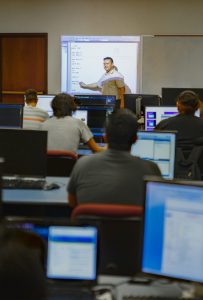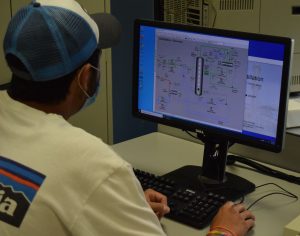(HARLINGEN, Texas) – The new coronavirus has impacted more than just social gatherings. In Texas, nearly 1.3 million people are unemployed because of the current pandemic, and that number continues to climb.
To help Texans get back to work, Texas State Technical College is deploying the Rapid Industry Skills and Employability (RISE) program that will allow students to quickly learn the skills they need to help them toward a new occupation.
“With so many Texans affected by the pandemic, we wanted to offer courses that would get them the skills needed to enter into industry quickly, while also focusing on providing flexible time commitments,” said Trey Pearson, TSTC’s regional director of student recruitment. “Some of the programs are completely online, and some are taught in a hybrid format, which allows students to complete the coursework while still working or taking care of their families.”
Upon completion, students earn an Occupational Skills Award, which is the formal name for the curriculum designated by the Texas Higher Education Coordinating Board. These short-term courses provide quick and basic entry-level skills that can open up opportunities for those experiencing unemployment and are seeking to get back into the workforce.
The courses are designed to feed into the regular certificates or degrees that TSTC offers if a student wants to pursue additional skills in the field. These courses provide graduates with the ability to apply for positions in their new fields, confident that they have the knowledge to start in a new job.
The idea of shortening the time to gain needed skills to enter the workforce has been in the works, but the current economic crisis necessitated starting the programs as soon as possible.
“RISE was accelerated because of the pandemic,” said TSTC Provost Edgar Padilla. “We’ve had this vision for a while to reduce the amount of time it takes for students to get quality training. The economic climate in the post-coronavirus world really created a sense of urgency for us to move quickly to be in a position to address the economic recovery in Texas.”
Students registered in the RISE program will begin this fall, and registration for the programs will be on a continuing basis.
“The registration process was kicked off in early July, and the applications have started to come in,” said TSTC Senior Vice President of Student Learning Hector Yanez. “These students will begin during our regular fall semester, and some of the programs are designed to be delivered and completed in as little as 7 1/2 weeks.”
Currently there are 12 short-term offerings available online, or via a hybrid format, but that number will change once the first cohorts complete their programs.
“As we continue to roll into the next fiscal year, the goal is to grow the inventory of options in the RISE curriculum,” Padilla said.
Tuition for these programs was also an important factor when they were being created.
“The Workforce Innovation and Opportunity Act allocated federal dollars to pay for short-term credentials,” Padilla said. “We have launched Occupational Skills Awards that are eligible for this funding immediately, and we have a team working on everything that needs to be in place in order for us to have that funding available for students.”
Hands-on training is one of TSTC’s strongest attributes, and it is something that is the key to the success of the RISE program.
“Every student enrolled will have the same access and opportunities as that of the traditional TSTC college student,” Yanez added. “The TSTC resource teams have been preparing and meeting to make sure that the needs and services of these students are met and provided.”
With a quicker curriculum, TSTC is hoping to provide stability for those seeking a rapid entry into the Texas workforce.
“These programs will really allow students the opportunity to rise to the occasion,” Padilla said. “This is designed to lead to some quality employment opportunities for students, which will ultimately be very impactful.”
To learn more about TSTC’s RISE program, visit https://www.tstc.edu/rise.







